New War In Africa? Al-Shabab In Somalia Must Be Dealt With, US General Says

The U.S. military has requested that the White House grant it more freedom in its approach to fighting a terror group that has been wreaking havoc in North Africa in recent years, Military.com reported. Aggressions by the al-Shabab militant group in Somalia could erupt into an all-out war, but the head of U.S. Africa Command was looking for ways to avoid turning the country into a "free-fire zone," he said Friday.
Specifically, Marine Gen. Thomas Waldhauser was looking for "a little bit more flexibility" to "process targets in a more rapid fashion," he told reporters at the Pentagon. That "flexibility" could include anything from authorizing drone strikes to must stronger military force. Waldhauser was looking to "power-down the decision making" to neutralize al-Shabab’s power in the region.
Read: Al-Shabab Leader Surrenders In Somalia
Al-Shabab, which is affiliated with the al-Qaeda militant group, has been launching offensives in North Africa since around 2006 in opposition to the country’s Western backing. The terror group has wanted to impose a strict interpretation of Islamic law throughout the nation to make it become a literal Islamic state.
Some of the group’s bloodiest attacks include suicide bombings in Uganda that killed 70 people and an assault on a college in Kenya that claimed 147 lives in 2015.
Most recently, al-Shabab militants claimed responsibility for killing 17 Somali soldiers and injuring 22 others in Somalia, according to a report by the SITE Intelligence Group on Thursday. However, the Somali government said the report was embellished and that just two people died, African media outlet News 24 reported.
Read: CIA Spies Beheaded In Somalia
If granted the aforementioned "flexibility" requested to engage al-Shabab in Somalia, U.S. military force would be employed very strategically and cautiously, Waldhauser said.
Nothing would happen unless "we know exactly who we are attacking on the ground," he said.
© Copyright IBTimes 2024. All rights reserved.





















